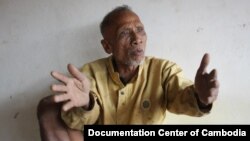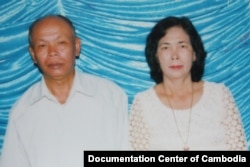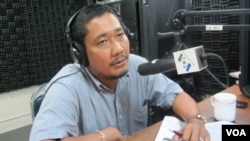Almost a year after charging former mid-ranking regime official Ao An with crimes against humanity, the Phnom Penh-based Khmer Rouge Tribunal last week expanded its case against the 83-year-old suspect, bringing new charges of genocide, torture and other serious crimes.
The decision by International Co-Investigating Judge Michael Bohlander appeared to indicate that the case against Ao An — former deputy secretary of the Central Zone of Democratic Kampuchea, who is better known by his regime alias, Ta An — is making progress. But observers question whether case 004, one of two currently on the hybrid United Nations-Cambodian court docket, will actually make it to trial.
In order for that to happen, Bohlander must complete preliminary investigations by June. Yet the political barriers that have seen a string of international judges quit the tribunal in frustration remain firmly in place. Cambodian judges on the tribunal possess significant powers of obstruction, and government officials have shown unwillingness to carry out arrests on behalf of investigating judges.
A further hindrance: Prime Minister Hun Sen has warned that Ao An should be spared prosecution at risk of reigniting civil war.
Government recalcitrance
By law, if the tribunal's pre-trial chamber can't find a reason to object to a case, it will move forward. But the question remains: Will Cambodian officials enforce the court's authority by compelling people to respond to pre-trial investigations?
Authorities can threaten arrest if people refuse to participate, but according to court spokesman Neth Pheaktra, that should not be necessary as long as suspects cooperate and show up when summoned.
"Based on the law and internal rules of this implementation, and according to the national law, the additional charge against anyone does not need to always arrest them all," Pheaktra told VOA Khmer. "We see there is cooperation from the suspects. They appeared in the court following the summons of the international judge."
Of the four suspects charged in the government-opposed cases, Ao An is one of three mid-ranking officials. Facing the same charges are Yim Tith, also known as Ta Tith, who was acting chief of the Northwest Zone, and Im Chaem, former district chief of Preah Neth Preah. In the other outstanding case, 003, only Meas Muth, the regime's navy chief, has been similarly charged with crimes against humanity and murder.
None are currently detained.
But even if they were, national judges — who generally adjudicate in accordance with Hun Sen's wishes regarding the two cases — hold majorities at each level of the court, and can therefore significantly slow the process by disputing which of the suspects are "most responsible" for the regime's crimes, a criterion written into the court's remit.
A political deal?
Long Panhavuth, a leading court monitor at the Cambodia Justice Initiative, says a political deal would be essential to move either of the cases to trial.
"Can it move to arrest and detention? The answer is: It's not possible if there is no political deal between the Cambodia government and the U.N.," he said, referring to claims among foreign observers that suspects have been shielded from arrest due to a shortage of international aid.
"[That's] an excuse," Panhavuth added. "The most important thing is that there is no cooperation between the national and international side."
Youk Chhang, executive director of the Documentation Center of Cambodia, says nobody can know whether the lengthy investigations into cases 003 and 004 have yielded enough documentary evidence to convict suspects until a trial is held. But numerous changes to court procedures are holding trials back.
"It's hard because this is in the hands of the lawyers and judges," he said. "They should respect the procedures and think about the justice for the victims. That is what should be more important than to change the procedure or any mechanism that is not thinking about ... what the victims want."
According to law professor Peter Maguire, who authored Facing Death in Cambodia, about Khmer Rouge war crimes and Cambodia's culture of impunity, the prime minister has consistently outmaneuvered both the U.N. and the tribunal's international donors.
"Although national law or international law is one factor, an equally important factor is power," he told VOA Khmer. "Does the U.N. have the power to compel the Cambodian government to arrest and try another series of defendants? Absolutely not."
Successfully bringing the suspects to justice seems unlikely, he said, even as pre-trial costs pile up.
"The U.N. is a guest in the kingdom," he said. "In order to move forward with cases 003 and 004, they need the support of the Cambodian leader Hun Sen. Not only do they not have it, they have never had it."
This report was produced in collaboration with VOA's Khmer Service.















